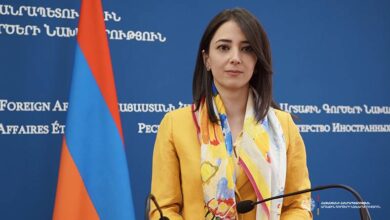
Azerbaijan’s burgeoning relationship with Israel has long been predicated on the false narrative that Azerbaijan is a “country of tolerance.” However, Azerbaijan, a dictatorship based on petrodollars that has been ruled by the same family for over a half-century, is anything but that, Alex Galitsky, communications director of the Armenian National Committee of America – Western Region, writes in an opinion piece published by The Jerusalem Post.
“Azerbaijan, a close ally of Turkey and fellow denier of the Armenian Genocide, has actively sought the eradication of the region’s indigenous Armenian inhabitants and traces of their millennia-old civilization,” he notes.
The author stresses that for the last 30 years, the Azerbaijani government has frequently deployed rhetoric advocating for the ethnic cleansing of Armenians in Artsakh and the Republic of Armenia itself – regularly referring to Armenians as enemies of the state – and denying the thousands of years of Armenian civilization in the region.
“Throughout the early 2000s, some 28,000 Armenian cultural monuments in Nakhijevan were destroyed by Azerbaijan as part of an unprecedented cultural genocide. Independent reports have also found that Armenophobia – or anti-Armenian sentiment – has become so entrenched in government, media, and state institutions that an entire generation of Azerbaijanis have grown up listening only to hate speech towards Armenians,”Galitsky writes.
He continued that “this dissemination and inculcation of hatred has incited shocking incidents of violence against Armenians, including that of Ramil Safarov, an Azerbaijani soldier who murdered a sleeping Armenian soldier during a NATO English-language training program in Hungary.”
Safarov was extradited to Azerbaijan six years into a life sentence handed down by Hungarian courts – but upon his arrival was pardoned, promoted in rank and lauded by the media as a national hero for doing his Azerbaijani patriotic duty by killing an Armenian.
Alex Galitsky notes that “despite its overtures to Israel with respect to weapons contracts, oil supply and the monitoring of Iran, Azerbaijan has succumbed to regional pressure when it comes to issuing political support for Israel – particularly in the forum of the UN.”
“Azerbaijan has also refused to open an embassy in Israel due to regional pressure. On the other hand, Armenia has consistently taken tangible steps towards good faith relations with Israel – including a commitment to establish an embassy in Tel Aviv,” he continues.
“Given that Armenia has been made partially reliant on Iran due to the fact that 80% of its borders are under illegal blockade by Turkey and Azerbaijan, it is clear that – unlike Azerbaijan – Armenia will not succumb to the pressure of malign regional actors when it comes to building relations with Israel,” he notes.
According to him, “Armenia, like Israel, has long fought for its very right to exist in a hostile region of states that would revel in its destruction, and has – against all odds – established vibrant democratic states in a sea of dictatorships.”
“Israel has chosen to take Azerbaijan at face value, accepting its oil in exchange for arms that have been deployed against Armenian civilians in ongoing border confrontations. Peer beyond the facade Azerbaijan presents, and Israel will find a regime that has consistently supported its adversaries, and is hellbent on eradicating the region’s native Armenian population – a clear affront to what the promise of Israel represents; self-determination and sanctuary for the persecuted and marginalized,” the author says.
“Israel knows first-hand the challenges Armenia faces, and has long fought against the type of state-sponsored racism Azerbaijan propagates. The two nations share an ancient history, and are bound by their experiences as long-stateless diasporic people whose resilience has allowed them to not merely survive, but to prosper. In light of this, it’s time for Israel to rethink its relationship with Azerbaijan,” he concludes.








